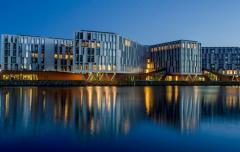Partner Spotlight: Industrial Energy Accelerator
Industry accounts for 38 percent of global total final energy consumption and around one-third of global greenhouse gas emissions. The Industrial Energy Accelerator, co-convened by UNIDO and Carbon Trust, is one of six programs launched by Sustainable Energy for All (SEforALL). We asked the Industrial Energy Accelerator team about its approach, its support for key countries and the critical role of energy efficiency for sustainable development.
Although often called an “invisible solution”, the UN Climate Action Summit brought energy efficiency to the forefront with the launch of the Three Percent Club – a coalition of governments and supporting organizations working together to put the world on a path to three percent annual efficiency improvement. How do you see industrial energy efficiency unlocking this potential? How can the Accelerator support countries achieve this increased level of ambition?
It was great to see energy efficiency highlighted at the UN Climate Action Summit with the launch of the Three Percent Club. As you mentioned, industrial energy efficiency can be overlooked in the vast array of climate solutions and environmental urgencies. Industrial energy efficiency often comes down to technical interventions and changing people’s behaviors. Retrofitting the insulation level of pipes or replacing an old inefficient boiler is not as tangible as installing solar-powered panels or as noticeable as saving forests. That’s why the Industrial Energy Accelerator is working to make this “invisible” solution visible through global and national advocacy campaigns and also by demonstrating the potential of industrial energy efficiency through real world case studies.
There is so much untapped energy efficiency potential in the industrial sector, especially in developing countries. With the right incentives, investment, policies and energy management systems in place, a huge amount of energy use could be avoided. In China, for example, where industry consumes the majority of the nation’s power supply, the equivalent of France and Germany’s energy use could be saved by 2040 compared to current trends. A projected 41 percent of this ‘saved energy’ could come from China’s industrial sector.
The Accelerator assists countries to unlock their industrial energy efficiency potential across a number of key areas of work which we call pillars: policy support, skills and capacity building, financing mechanisms, and pipeline or market development. In Mexico, for example, where the government put in place a number of energy efficiency programs and regulations, the Accelerator is working to improve access to training and certification in energy management so that companies have the capacity to meet these regulatory requirements. Meanwhile, in Brazil, there is a high degree of perceived risk and uncertainty from the financial sector around industrial energy efficiency investments. There the Accelerator is working to deliver a series of workshops and events to strengthen the capacity of banks and financing institutions in the appraisal of energy efficiency investment projects from a risk management perspective.
The Accelerator’s mission is to drive global action towards industrial energy efficiency for people, countries and the planet. How do you ensure that your work has a positive effect on all three levels?
The easiest and cheapest clean energy solution lies in the energy we don’t use. Most attempts to reduce carbon emissions in order to mitigate climate change will have positive impacts on people, the planet, countries and their economies. The development community loves to champion ‘win-win’ solutions, and in the case of industrial energy efficiency, there really are no losers. In business terms, a large scale shift toward industrial energy efficient practices can enable companies and industry to massively reduce their power bills, in some cases by up to 30 percent. Energy efficiency in an industry also increases productivity, lowers manufacturing costs, and creates more jobs. Such gains can add another 50 percent in economic benefits on top of direct energy cost reductions.
Energy efficiency in the industrial sector can also advance the Sustainable Development Goals (SDGs). This includes increased disposable income and economic growth as well as improved local air quality with the associated health benefits. It is estimated that energy efficiency, more broadly, could achieve nearly half of the emission reductions required to keep global temperature rises below catastrophic levels.
You are currently working in five countries – Mexico, Brazil, Morocco, China and Indonesia. Why did you choose these countries? What are the similarities and differences among these countries?
The Accelerator currently works in five industrial countries which are collectively responsible for around 26 percent of the world’s energy consumption. Aside from Morocco, the countries which the Accelerator tends to focus on are also among the biggest carbon emitters in the world. While some of our project countries have larger industrial sectors than others, they all share a common proactive spirit to advance their industrial energy efficiency agendas.
In Morocco, for example, accelerating the uptake of industrial energy efficiency is critical for energy security. Morocco imports more than 90 percent of its energy therefore the country is taking bold steps to ensure it can power its growing economy long into the future.
On the other hand in a country like Indonesia, which has an abundance of domestic oil and gas fields, improving economic competitiveness is at the top of the development agenda. Through the implementation of industrial energy efficiency policies and management systems, Indonesia’s industrial sector could conserve as much as 30 percent of its current energy use. Such a saving in energy would cut emissions and help to minimize production costs as fuel subsidies are gradually reduced.
What are the key barriers to implementing industrial efficiency measures in these countries? What is needed to break down these barriers?
The Accelerator recognizes that every country and industry is unique. This requires a tailored approach to address regional contexts and barriers to energy efficiency. Generalizing across sectors without due diligence can lead to a misdiagnosis of the key obstacles for certain end-users. Therefore, the Accelerator established a diagnostic tool to support countries in carrying out an assessment of the industrial energy efficiency opportunity in their market.
As the country diagnostic reports highlight, unfortunately, there is no silver bullet to addressing the barriers that prevent a rapid uptake of industrial energy efficiency systems and technology. Typically, in immature energy efficiency markets, barriers are likely to be numerous and varied. However, there are three broad categories that they are likely to fall within: a lack of awareness and policy drivers, limited technical solutions or expertise, and insufficient financial resources.
Collaboration is key to enabling a holistic effort to break down these barriers simultaneously. There is no point in introducing a certification scheme for energy managers if there is no policy drive in the country that would create demand for services of energy managers. Likewise, without an adequate amount of finance and incentives, it is unrealistic to expect companies to invest in energy efficiency unless energy prices are really high in that country. We have to address the entire system.
At a broader level, awareness of what is possible is critical. Success stories need to be championed by industry leaders and governments who have experienced and witnessed the benefits of industrial energy efficiency first hand. The Accelerator can help to share these stories, but in order for them to be heard, they need to be told by those on the ground, in the factories and at the political decision-making table.
How can governments or businesses partner with the Industrial Energy Accelerator?
The Accelerator is currently scoping opportunities to expand our project portfolio in 2020. We hope to attract enough funding to begin work in five new countries next year, and an additional five in 2021. This is a great time for government partners interested in working with the Accelerator to engage with our team. We also invite companies and the business sector to get involved. Partnering with the Accelerator is an opportunity to help shape the future of the industry and our planet. Whether stakeholders are interested in simply staying up to date with the latest developments in industrial energy efficiency or would like to inquire about participating and/or sponsoring some of our work, we encourage them to get in touch with us. All of our partners are recognized internationally for their commitment to accelerating industrial energy efficiency for people, planet and countries.
To learn more about the Industrial Energy Accelerator visit: www.industrialenergyaccelerator.org
For partnership inquiries contact: Rana Ghoneim, Global Programme Lead, UNIDO




